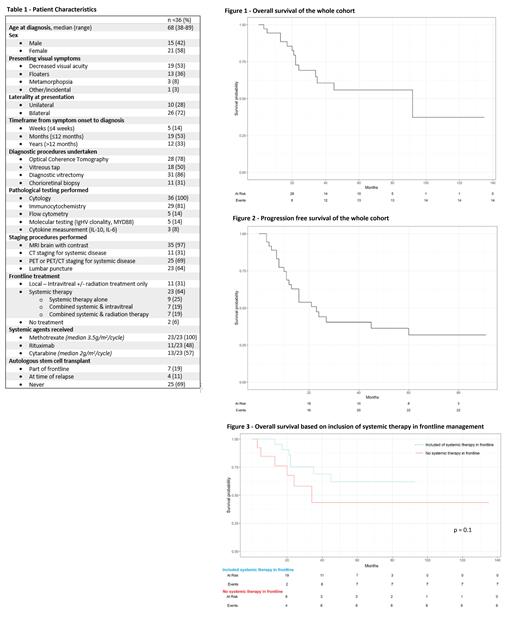Background:
Primary vitreoretinal lymphoma (PVRL) is a rare high-grade extranodal non-Hodgkin lymphoma characterized by frequent and often fatal central nervous system (CNS) relapse. Despite improved outcomes for patients with primary CNS lymphomas over the last decade, approaches to the diagnosis and management of PVRL remain contentious. Given limited prospective data to date, there is need to better elucidate current international practice in the modern era to optimize outcomes for this patient group.
Methods:
Patients with pathologically confirmed PVRL diagnosed between January 2010 and December 2022 were identified from ten sites across Australia, Singapore, Canada and the United Kingdom. Patients were aged ≥18 years, with isolated PVRL at diagnosis (i.e. no concomitant CNS involvement at baseline or secondary vitreoretinal involvement). Variables included were baseline demographic data, presenting symptoms, diagnostic procedures undertaken and sample characteristics such as cytological, immunocytochemical and flow cytometric features. Where available, molecular results and biomarkers such as IL-10 and IL-6 were also collected. Treatment approaches including local, systemic and combined local/systemic therapies were captured. Outcomes measured included response rates, patterns of relapse, progression-free (PFS) and overall survival (OS).
Results:
36 patients were identified with a median age at diagnosis of 68 years (range 38-89) with a female predominance (58%). Most patients presented with bilateral involvement (72%) with decreased visual acuity being the predominant presenting symptom (53%). Most patients received a PVRL diagnosis within weeks to months of symptom onset, however a third of patients had >12 months delay to diagnosis. Ancillary diagnostic tests such as flow cytometry, molecular and cytokine measurements performed in a minority of patients only, largely due to sample viability and paucity. Concurrent CNS involvement was evaluated by brain MRI in 97% with diagnostic lumbar punctures performed in 64%. Exclusion of systemic disease was predominantly done via PET or PET/CT (69%) with the remainder via CT alone (Table 1).
Upfront treatment choices were highly varied across participating sites with incorporation of systemic therapy in the majority (64%) of cases, either alone (25%) or in combination with local therapies (39%). For those who received systemic therapy, all incorporated high-dose methotrexate with the median dose delivered of 3.5g/m 2 per cycle and rituximab was incorporated in 48%. Autologous stem cell transplantation (ASCT) was part of frontline management in 19% of cases, and the median age of those receiving frontline ASCT was 55 years versus 71 years in those who did not.
With median follow-up of 57 months (IQR 24-74 months), the median OS was 90 months whilst median PFS was only 23 months (Figures 1 and 2). 18 patients experienced disease relapse during follow up, only 2 of which had received frontline ASCT. The median PFS and OS of those who received frontline ASCT was not reached and 92 months respectively. Patients who had systemic treatment incorporated into frontline management had a trend toward improved OS than those who did not (Figure 3). Of those with relapsing disease, 14 (78%) had CNS involvement, and 29% of these patients experienced concurrent CNS and systemic involvement at relapse. Median OS from time of relapse was 8 months (IQR: 3-89 months). Of the 14 deaths occurring during follow up, 6 (43%) were secondary to lymphoma, 2 (14%) were related to toxicities of treatment and the rest were unknown or related to other co-morbidities.
Conclusion:
To our knowledge, this is the largest international multicenter cohort of patients with isolated PVRL reported in the modern era. The apparent improvement in OS compared with historical cohorts may reflect improvements in therapy in the recent decade, and incorporation of systemic therapy in frontline management demonstrated a trend to improved OS. However, high rates of CNS relapse continue to be a challenge. Delays in diagnosis and variation in diagnostic and management pathways reflect the need to develop prospective studies and international consensus guidelines for managing this rare lymphoma.
Disclosures
Tang:Janssen: Other: Travel to scientific conferences. Lewis:Janssen: Honoraria; Loxo/Lilly: Other: Travel, Accommodations, Expenses and Trial Steering Committee; Merck/MSD: Other: Advisory Board participant; Roche: Consultancy, Honoraria; AstraZeneca: Consultancy, Honoraria. McKay:Takeda: Consultancy, Other: Travel to scientific conferences; Roche: Consultancy; Janssen: Consultancy, Honoraria, Other: Travel to scientific conferences; Incyte: Consultancy, Honoraria; Gilead/Kite: Consultancy, Honoraria, Other: Travel to scientific conferences; Celgene/BMS: Consultancy; Beigene: Consultancy; AstraZeneca: Consultancy; Abbvie: Consultancy. Cheah:Genmab: Consultancy, Honoraria; Gilead: Consultancy, Honoraria, Membership on an entity's Board of Directors or advisory committees; Janssen: Consultancy, Honoraria, Membership on an entity's Board of Directors or advisory committees; Roche: Consultancy, Honoraria, Membership on an entity's Board of Directors or advisory committees, Other: TRAVEL, ACCOMMODATIONS, EXPENSES, Research Funding; TG therapeutics: Consultancy, Honoraria, Membership on an entity's Board of Directors or advisory committees; BeiGene: Consultancy, Honoraria, Membership on an entity's Board of Directors or advisory committees; Novartis: Consultancy, Honoraria, Membership on an entity's Board of Directors or advisory committees; AstraZenecca: Consultancy, Honoraria, Membership on an entity's Board of Directors or advisory committees; MSD: Consultancy, Honoraria, Membership on an entity's Board of Directors or advisory committees, Research Funding; Lilly: Consultancy, Honoraria, Membership on an entity's Board of Directors or advisory committees, Research Funding; Menarini: Consultancy, Honoraria; AbbVie: Research Funding; BMS: Consultancy, Honoraria, Membership on an entity's Board of Directors or advisory committees, Research Funding; Ascentage Pharma: Consultancy, Honoraria, Membership on an entity's Board of Directors or advisory committees; Daizai: Consultancy, Honoraria. Prica:Astra-Zeneca: Honoraria; Kite-Gilead: Honoraria. Smith:Abbvie: Consultancy, Honoraria, Other: Travel to scientific conferences; MSD: Consultancy, Honoraria; AstraZeneca: Consultancy, Honoraria; Janssen: Other: Travel to scientific conferences.


This feature is available to Subscribers Only
Sign In or Create an Account Close Modal